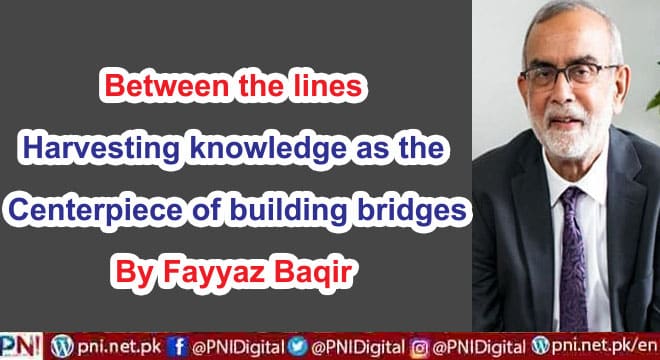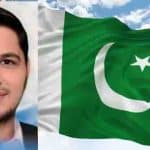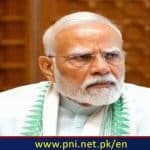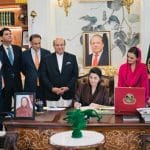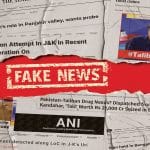Global conflict feeds on several divides- based on class, caste, race, gender, faith, and power. Conventional thinking patterns have tried to cross these divides with power and pelf. There were people who took exception to these views and believed that these divides could be overcome by building bridges between the conflicting identities shaped by human knowledge deficit; by discovering the plurality of self and other. Self and the ‘other’ are connected to the haze of the unknown. This unknown is the territory of hope and fear. Awareness of self and engagement with the other cause hope; distance and disengagement cause fear. The act of engagement is an act of discovering the unknown. An overview of contemporary social patterns confirms that divisions without engagement lead to conflict and discrimination handled with engagement lay the foundations for peace and justice. Awareness of the potential of engagement strategies provides a conducive environment for lasting peace. It leads to the development of knowledge for building bridges and promoting pluralism.
The twentieth century is witness to renewed human quest for overcoming limitations of human knowledge which have caused, sustained, and intensified social conflicts throughout human history. Various leading political thinkers, social practitioners, and academics highlighted dimensions of knowledge deficit which result in erecting walls around different social formations. Leading thought and practice leaders in the domain of bridge building include Mohandas Karamchand Gandhi, Paulo Friere, Robert Chambers, Akhter Hameed Khan, Ernesto Sirolli, Chris Anderson, Hernandez De Soto, Edward Snowden, and Julian Assange. They designed effective knowledge-harvesting tools for engaging adversaries in conflict prone situations.
Mohandas Karamchand Gandhi convincingly demonstrated that the process of building bridges begins with discovering the plurality of self; awareness of the simultaneous existence of fear and hope in an individual; and discovering the same in the other; overcoming personal fear and engaging with the flicker of hope in the other by becoming vulnerable and in the process constructing new identities of the same and the other. This was a great leap from the fixed to fluid concepts of the same and other and a method of harvesting tacit knowledge for realizing human hope for peace, justice, and freedom. Gandhi’s main tool was a non-violent political action.
Paulo Freire, unveiled through the pedagogy of oppressed a strategy for helping ‘objects of oppression’ discover their agency and play out their inner vigor to realize their human potential. This was another way of converting tacit knowledge of self, through dialogue, into a path of personal liberation and social change and in the process humanizing and liberating the oppressor also. The process began with the identification of emotionally charged words and generative themes to discover deeper meaning, the social context of the reality associated with these words, and charting out the path for changing social reality.
Robert Chambers drew attention to the dimension of the social reality of the poor and demonstrated that in the process of poverty alleviation and social change, it is the reality of the people not of outsiders that counts. For any meaningful social change to take place it is important to take into account the perception of the poor. Poor might be illiterate but they are not irrational or ignorant. They can provide the most authentic knowledge of ends and available means and outsiders can provide knowledge of making the best use of resources in meeting their needs. The tool designed for this purpose was Participatory Rural Appraisal (PRA).
During the second half of the twentieth century leading South Asian development practitioner Akhter Hameed Khan pointed out that the collapse of feudalism had created a social vacuum that could be filled by people’s institutions, mafia, or merchants of violence. An inclusive solution by people’s institutions could prevent encroachment by mafias and violence brokers. This entailed gathering knowledge of social reality. He discovered four barriers that hamper community based development: i) psychological barrier-the belief that government is responsible for everything; ii) social barrier-lack of cooperation between the community members; iii) technical barrier-lack of sound technical solutions in line with the socio-economic conditions of the poor and iv) financial barrier-inappropriate costing of economic solutions. His solution for crossing these barriers was to harvest tacit community knowledge by using the tool of Diagnostic Dialogue. The Diagnostic Survey started with a visit by the Management Group to a village whose residents agreed to meet with Aga Khan Rural Support Programme (AKRSP) staff. Villagers were told that AKRSP would provide a grant for the project identified by the community on the condition that they agreed to i) form a village organization (VO) ii) elect their office bearers by consensus iii) meet and save regularly. Communities were asked to choose leaders who could be easily brought under check by them in case of disagreement with the community. The identification of a project was followed by the second series of dialogues to prepare a feasibility survey of the proposed scheme in consultation with the villagers. It resulted in doubling the income of one million people in ten years.
Ernesto Sirolli, through his failed attempt to alleviate poverty in rural Africa, learned three principles: i) when you go to the people “shut up and listen to them”. ii) By your work become worthy of invitation iii) People don’t need your money or ideas, they want you to connect their skills to the market i.e. integrate your knowledge with their knowledge. The starting point is harvesting their knowledge.
Chris Anderson harvested the knowledge generated by innumerable enterprises navigating the web space. He discovered that the new market is shaped like a Long Tail. It is shifting away from a focus on a relatively small number of “hits” (mainstream products and markets) at the head of the demand curve and toward a huge number of niches in the tail. This knowledge of the nature of opportunities in cyberspace shows the path of hope under the clouds of disillusionment and alienation pushing a considerable number of youth to the violent alternative.
Hernandez De Soto pointed out that the right of the poor to have the title for the property owned by them and the right to operate the small business is almost nonexistent in the informal sector of post-colonial states. This is another form of preempting harvesting of tacit knowledge. This is a formidable barrier in the way of transition from community economies to market economies. De Soto’s findings were based on extensive field based research in places as far apart as Peru, Egypt, the Philippines, and Haiti. In De Soto’s words, world poverty is characterized not by a lack of financial resources by the poor but by their lack of access to financial markets. This happens due to a lack of legal ownership title for the property they own. Lack of legal titles deprives them of the opportunity to convert their physical assets into liquidity and unlock their capacity to become part of the capital market in the formal sector. This legal failure keeps aspiring entrepreneurs in the informal sector tied to a “small circle of specialization and low productivity”. All extralegal settlers, contrary to their lawlessness, share the desire of civil society to lead peaceful, productive lives. The extralegal sector provides infrastructure, roads, water supply, sewerage system, electricity, construction of markets, transport services, and administration of justice and maintenance of order, and the legal system is battling against formalization of all these economic activities to the detriment of the poor.
According to De Soto, “The value of savings among the poor is, in fact, immense, -forty times all the foreign aid received throughout the world since 1945”.The major stumbling block that keeps the rest of the world from benefitting from capitalism is its inability to produce capital. This can be done by transforming people with property interests into accountable individuals as formal property creates individuals from the masses. He pleaded to harvest tacit knowledge of assets and integrate in the market economy. This would amount to opening up capitalism to the poor and generate new sets of relationships contributing to inclusive governance.
Adil Najam pointed out that the full potential for citizen-state engagement cannot be realized due to a lack of awareness of the common space between the state and the citizenry. Groups claiming the right to development have four distinct possibilities in their interaction with the State. They may have: i) similar goals and similar means which would lead to a cooperative relationship; ii) Similar goals and dissimilar means resulting in complementarities. iii) Dissimilar goals-similar means in which case engagement is possible only through cooptation and iv) dissimilar goals and dissimilar means, leading to confrontation. Without a lack of knowledge of local reality, the space available for engagement and distinction between the barrier and opportunity may be lost.
Edward Snowden and Julian Assange have led the tradition of harvesting hidden knowledge of the ‘other’. As Sun Tzu pointed out “if you fully know yourself and your enemy, you can win the war without fighting”. Snowden and Assange have strengthened the foundation for winning the war for justice without fighting by unveiling the dark secret world of global politics, business, and crime.
Knowledge of similarity with the ‘other’ is as important as the knowledge of difference within the ‘same’. Indian Emperor Ashoka’s son’s story is very revealing in this regard. Ashoka sent his son to Taxila to subdue the local Raja who had refused to pay the tax. Arriving at the battleground the prince did not move his troops. Raja got tired of this incomprehensible delay and asked for a meeting. Prince agreed to meet the Raja privately. On meeting the prince Raja asked, why don’t you send the troops to fight? Prince replied, why the troops should lay their lives for the shift of power from one individual to another. Why don’t the two of us fight without spilling the blood of thousands for our personal gain? Let the winner be the taker. Raja was so deeply touched by this wise counsel and the war was averted.
Follow the PNI Facebook page for the latest news and updates.


